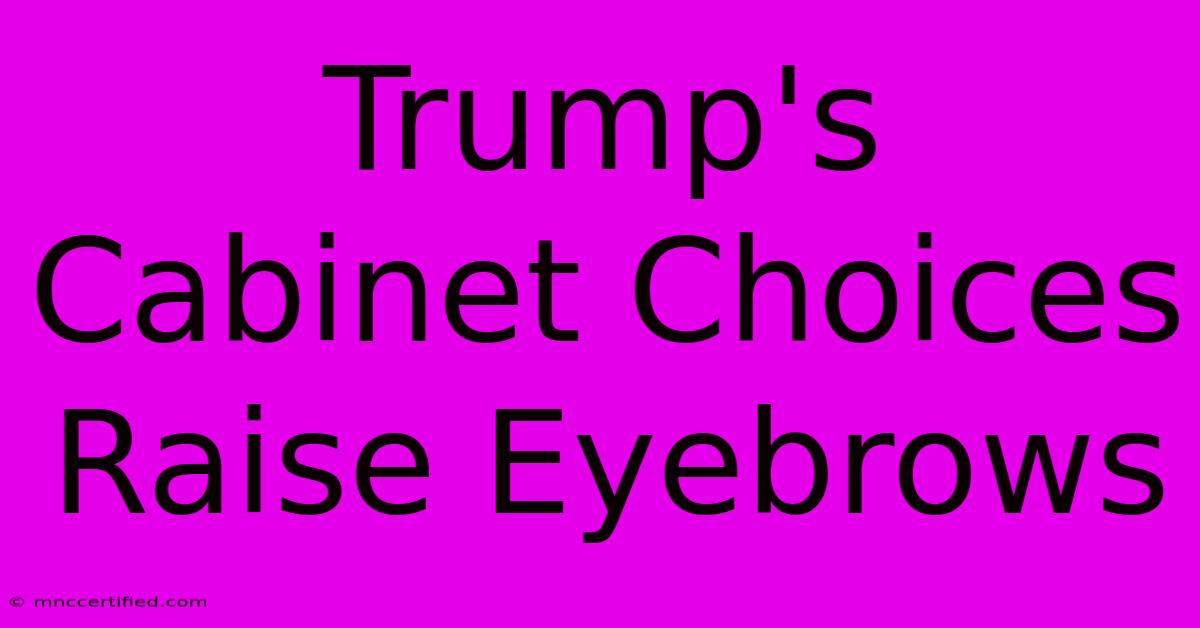Trump's Cabinet Choices Raise Eyebrows

Table of Contents
Trump's Cabinet Choices Raise Eyebrows: A Look at the Controversial Selections
Donald Trump's cabinet selections in 2016 were a major talking point during his presidency. While some appointments were considered conventional choices, others sparked controversy and debate. This article delves into the most notable selections and the reasons why they raised eyebrows.
The Business Tycoons: A Shift in Government
Trump's cabinet was heavily populated by individuals with backgrounds in business rather than traditional government service. This departure from the norm led to concerns about potential conflicts of interest and a lack of experience in navigating the complexities of government.
Here are some of the prominent business figures who joined Trump's cabinet:
- Wilbur Ross: Secretary of Commerce, known for his success in the restructuring of distressed companies. His appointment raised concerns about potential conflicts of interest due to his vast business dealings.
- Betsy DeVos: Secretary of Education, a prominent figure in the charter school movement. Her lack of experience in public education and her support for privatization drew criticism from educators and education advocates.
- Steve Mnuchin: Secretary of the Treasury, a former Goldman Sachs executive and Hollywood film producer. His wealth and Wall Street background fueled concerns about his ability to prioritize the needs of ordinary Americans.
Controversial Choices with a Focus on Ideological Agenda
Beyond the business tycoons, several cabinet selections were known for their strong ideological stances and positions that differed drastically from the previous administration.
These appointments stirred significant debate and raised concerns about the future direction of various government agencies:
- Jeff Sessions: Attorney General, a former senator known for his conservative views on immigration and criminal justice. His appointment was met with protests from civil rights groups and concerns about potential discrimination.
- Scott Pruitt: Administrator of the Environmental Protection Agency, a former Oklahoma attorney general who had a history of challenging environmental regulations. His appointment was met with strong opposition from environmental advocates, who feared a rollback of environmental protections.
- Ben Carson: Secretary of Housing and Urban Development, a retired neurosurgeon and a prominent conservative figure. His lack of experience in housing policy and his controversial statements about social issues fueled concerns about his ability to effectively lead the agency.
The Aftermath of the Controversial Selections
The impact of Trump's cabinet selections was felt across various government agencies and policies. Some of the notable consequences included:
- A rollback of environmental regulations: Pruitt's leadership at the EPA led to a reduction in environmental protections and a weakening of regulations on industries that contribute to pollution.
- A shift in education policy: DeVos's focus on school choice and charter schools resulted in funding cuts for traditional public schools and a shift in power towards private institutions.
- Increased polarization on immigration: Sessions's tough stance on immigration led to a rise in deportations, increased border security measures, and a controversial travel ban targeting Muslim-majority countries.
Conclusion: A Legacy of Controversy
Trump's cabinet selections left a lasting mark on American politics. The emphasis on business experience, the focus on ideological agendas, and the resulting policy changes sparked heated debate and divided the country. While some argued that these appointments brought fresh perspectives and a needed shake-up to government, others criticized the lack of experience, the ideological biases, and the potential for conflicts of interest.
The legacy of Trump's cabinet selections continues to be debated, and their long-term impact on American society remains to be seen. However, there is no doubt that they played a significant role in shaping the political landscape of the Trump presidency.

Thank you for visiting our website wich cover about Trump's Cabinet Choices Raise Eyebrows. We hope the information provided has been useful to you. Feel free to contact us if you have any questions or need further assistance. See you next time and dont miss to bookmark.
Featured Posts
-
Gaetz Under Ethics Investigation Chosen By Trump
Nov 14, 2024
-
Wembanyama Makes History With 50 Point Game
Nov 14, 2024
-
Cava Stock News Wednesday Trading Insights
Nov 14, 2024
-
Olivia Munn Barely Knew John Mulaney During Pregnancy
Nov 14, 2024
-
Loggerhead Insurance Company Reviews
Nov 14, 2024